Monday September 12

|
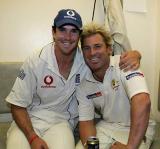
Pietersen and Warne: two titanic performances that lit up the final day of an enthralling series
© Getty Images
|
|
There have been many complaints during this Test about the translucent sight screens through which the press have been expected to peer, and there were grounds for another yesterday: they were not nearly dense enough. As England closed in on the Ashes, there were periods when both press corps would have preferred they turn to black, to spare their discomfiture. Perhaps it is as well cricket is leaving terrestrial television. One would not want people of nervous disposition coming upon it by chance: there has been, this summer, a severe risk of becoming hooked.
England hold the Ashes. What a strange feeling it is to write that line - one it has seemed at times in the last sixteen years might never be written again. They beat Australia, moreover, not by guile or stealth, but by the means Australia has popularised: bold batting, nakedly aggressive bowling, shrewd captaincy, excellent ground fielding and some very good catching. In other words, they stole Australia's clothes; Shane Warne's Herculean
efforts, marvellous as they were, were a green and gold figleaf.
This has been a series of inches, nonetheless, and we might be writing quite differently this morning but for a few from the last day at the Oval. What if Pietersen's outside edge had not grazed Gilchrist's gauntlet and instead travelled straight to slip when the batsman was 0? What if any of Brett Lee's bouncers had arrived on a slightly higher vertical plane and foiled one of Pietersen's crazy-brave hook shots? What if McGrath had been fully
fit? What if Warne had been captain? This last is perhaps the great imponderable of the whole series. Whether Australia would have won had Warne been able to transfer his death-before-dishonour philosophy to captaincy is inherently unknowable. I think it is possible to say, however, that Australia would not have been so convincingly outgeneralled. Cricket Australia, then, may have paid a high price for stripping Warne of the
vice-captaincy five years ago; Warne has certainly paid dearly for the joy of text.
Nothing should be taken away from Pietersen. Dr Johnson said that much could be made of a Scotsman, if caught young. The same might be true of a South African. No one would have been entirely surprised had he been swept away by the wave of aggression of Warne and Lee. In fact, he met it head-on. Once upon a time, a match situation like the fifth day at the Oval would have been a pretext for the deadest of bats and the dourest of tempers. Pietersen gave us a 21st Century Draw, correctly intuiting that time could be stolen from the Australians two ways: by its absorption, and by the compilation of runs that would take getting.
I watched every ball of this series in person, except perhaps a few I couldn't bear to look at. It's been an honour. It remains only to thank my colleagues at Cricinfo, in England and India, who've allowed me such scope to indulge myself. And while in a thanking mood, I should also express my gratitude to the other members of Team Guardian: Mike Selvey, Richard Williams, David Hopps, Lawrence Booth, Alex Brown, Steve James and Paul
Kelso. It would have been a great series anyway, of course, but it wouldn't have been nearly so much fun to write about without them. Uniquely in my experience, not once in the last two months has a cross word been exchanged: summer 2005 will go down as by far the most enjoyable period of my professional and cricket life.
Sunday September 11

|

Andrew Flintoff's strength and stamina was too good for Australia
© Getty Images
|
|
Glimpsed outside Oval tube station yesterday morning: a lugubrious man
holding a card reading "One ticket wanted for English masochist." Le vice
Anglais is alive and well: support for England's cricket team that is.
For English fans, in fact, it proved a day of hugely enjoyable sadism. Not
only did Australia's first innings crumble under the blows from Andrew
Flintoff's wrecking ball, but the light closed in patriotically at 3.42pm
when England's innings was just 13.2 overs old and play was finally
abandoned at 6.15pm. It is still not beyond the wit of Warne to win this
Test for Australia, but he will need everything in his favour.
On Flintoff's only tour of Australia, he arrived unfit, became still less
fit, and was finally fit only to go home just after Christmas. His closest
friends would surely not have bet on his ability to last this series as a
key bowler, let alone finish it with a spell that went on like a bottomless
cup of coffee. Last night, Flintoff exhorted his teammates to leave their
last ounce of energy on the ground in fighting this game out; today was a
case of do as I do as well as I say. The Red Bull ads that kept flashing on
the screen seemed the acceptable face of product placement.
No Australian has played Flintoff with comfort this series. Yesterday they
seemed to have settled on the plan of seeing him out and profiting at the
other end, but today he simply outlasted them. It was no good scoring only
at one end when there was an arrears to clear and a lead to build; Hoggard
cleaned up when the batsmen tried to relieve the pressure otherwise. There
will be pressure at both ends tomorrow, at least for as long as McGrath can
keep Warne company. The climax of the Ashes tomorrow could be brilliant; an
anti-climax would still be well worth watching.
Saturday September 10

|
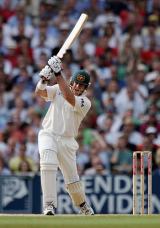
Matthew Hayden's bully-like aggression was back to the fore at The Oval
© Getty Images
|
|
Scorelines such as Australia 0 for 185 and 1 for 264, incongruous this summer but in their time as routine as "lbw b Alderman", made a belated reappearance at The Oval this afternoon. But England would also not have been entirely displeased by a day on which eyes were trained as anxiously skywards as they were on the field of play.
Justin Langer and Matthew Hayden recovered some of their former harmony by prolonging their partnership to 185, an Australian record at The Oval and a testament to their understanding. Both scored hundreds. The tide in English luck in this series also continued to ebb: the only person who did not believe that Langer was lbw to the day's first ball and that Ponting was
not caught at short leg after tea was the only one who mattered, Billy Bowden.
In the Test overhead, however, the clouds scudded England's way, for a delayed start and three interruptions trimmed the day to 197 minutes, with only 45.4 overs from its adjusted allocation of 98 being bowled. It is almost as though what Shane Warne calls `the man upstairs' and Bowden called his `third umpire' will only accept this series being decided in the last hour of the final day.
Once the early rain cleared, Australia's openers continued their steady progress. In what soon became Australia's biggest partnership of the series, Langer was clearly the senior partner, like daring Dash dragging Mr Incredible into the fray. He punched hard into gaps, flickered fast between wickets, and continued to grow in historic stature: his tenth boundary brought his 22nd Test hundred, his eleventh a 7000th Test run that took him past Sir Donald Bradman's long-standing run benchmark.
Hayden was content to cruise along in Langer's slipstream, secure enough without ever quite finding touch. He pulled Harmison's first ball for a succulent boundary before lunch, and clubbed Hoggard through cover in the air in reminiscent vein a few overs later, but otherwise played within the limits against which he has tended to fight for the last year. He might have been both caught and run out by Paul Collingwood in the first half hour, then on 46 parried Hoggard just wide of Strauss at second slip.
For a time, England looked bereft of ideas, with the Australians content to simply keep Flintoff at bay. England did not sniff a breakthrough until Harmison, who had bowled to the openers as though someone was waving his passport at him, suddenly found a yard. His fifth over of the day had everything: eleven runs including two bouncers called wides, and a third, pedantically, a no-ball. For once, however, Harmison did not begin pining for his fireside and village pub; he became faster with each succeeding ball, and finally barged through Langer's defence, like a nightclub bouncer bursting through a crowd.
Then came the rain, if not in the copious quantities one had been led to expect by climatologists, but quite sufficient for England's needs, and a growing impediment to Australia's hopes. Usually under these circumstances, crowds grow restive; for fairly obvious reasons, onlookers at The Oval looked most cheerful when their umbrellas were open.
Neville Cardus wrote a piece for the Spectator in 1964 where he described the changing humours of the crowd at the summer's Lord's Test. All the while play was in progress, they bleated and bickered about the appalling standard of England's cricket, the dreadful strokes and abysmal bowling through which they were suffering. Rain was no intrusion; on the contrary,
it was a welcome respite from workaday care. Everyone cheered up. People talked to their neighbours. Conversation turned to happier matters. Cardus claimed that he had not seen Londoners so united since the Blitz and, struck by the contrast, fantasised of cricket grounds where it would be guaranteed that no play would take place, with perhaps a band to provide a cheery soundtrack. At last, perhaps, Cardus's idea has taken root.
The break also allowed the security Green Team to reinvade the square, where they have developed a curious habit of remaining on the square until not only the fielders are in position but the batsman have arrived in the centre. One almost expects them to run a metal detector over the umpires and demand that the batsmen account for those suspicious bulges. `Thigh pad? Turn it up. That's what all the holy warriors say.' While everyone is bound to feel safer for the protection of the thin green line, the risk of suicide streakers might be felt to have fallen since the weather got colder. Perhaps the Green Team could be redeployed more gainfully guarding the
Man-of-the-Match votes and the upright urinals - bound to be considered profane by extremists because of their savour of democracy and bodily secretions.
While the rain was a welcome opportunity for England's four-man attack to recharge, its effect on the outfield was to reduce the chance that reverse swing would be a factor. Hayden duly picked up the pace after the interruption, and began to look more like the batsman who averaged 70 for
forty-two innings in the middle of his career rather than one who had not reached 70 for his last thirty innings. Harmison was pulled eagerly. What used to be the most damaging sweep in the world reappeared. The luck continued. In the same over as Bowden failed to detect a thick inside edge onto Ponting's pad caught by Bell at silly point, Hayden's outside edge bisected keeper and slip; Giles, in fact, did rather well to contain himself. Had Warne been the bowler, the stump mics might have to have been turned down for the next half hour.
Flintoff finished the day with its best spell, breaking 90mph, and proving that Martyn posesses the quietest edge in international cricket: those off the inside of the bat went undetected at Old Trafford and Trent Bridge; the outside is apparently just as muffled, for not even the slips picked up the fine nick to the keeper when the batsman was 7.
Flintoff's hostility had one reward, encouraging Hayden and Martyn to come off for bad light at 6.25pm with 6.2 overs remaining. Given that this has been a series of such fine differences, turning on single decisions and handfuls of runs, the batsmen's was a strangely unambitious decision. The scoreline of this series is still wide open, but Australia's ability to alter it diminishes ever so slightly with each passing minute.
Friday September 9

|
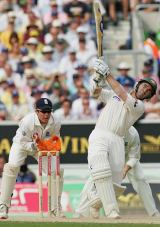
Justin Langer's attack against Ashley Giles was a rare moment in a largely patient effort
© Getty Images
|
|
Day Two in the Stevie Wonder Press Box, as it has been christened by Mike Walters from the Mirror, and the darkness was not all caused by the glass. At tea, the covers were pushed anxiously toward the centre amid encircling gloom, which gradually moistened. The two sessions we enjoyed, however, were enough to confer on Australia a strong advantage. The period around lunch on the first day also grew in significance - how crucial were Warne's incisions, and how culpable was England's carelessness. In the afternoon, Langer and Hayden batted with all the patient application that had eluded Trescothick, Vaughan, Bell and Pietersen. The only departure from type was Langer's response to Giles' first over - curiously from the Pavilion rather than Vauxhall End - which was to find some room in the air down the ground. Otherwise, the pair fossicked for another hundred stand as prospectors in the Yukon might seek a nugget: with patience driven by the belief that the find would be worth it.
The morning session had did not show Australia to good advantage. There was only Warne and McGrath. Lee bowled badly, Tait not all, and the captaincy was so conservative that it was possible to imagine Ian Chappell pulling his hair out in handfuls in Sydney. It is said of some batsmen that one looks up, finds they are 30, and cannot remember how they scored them; Matthew Hoggard brings nature into balance, for one looks up periodically expecting to learn that he has scored only to find him still runless. Yet Lee bowled
to him with a mid-on and a deep point, and no close catcher. Ashley Giles was flattered by seven men on the boundary when he faced McGrath, Steve Harmison discomforted by no short leg or silly point when Warne began bowling to him. And while this was manifestation of Australian shortcoming, it was also evidence of what an opportunity was forgone in England's first innings. On what has been observed so far, Australia has a two-and-a-half man attack. And even though two of those men are McGrath and Warne, neither
can bowl indefinitely. That sense that England failed to put Australia away in the first innings is likely to be cause for a growing sense of gloom throughout this match even without the agency of the windows.
Thursday September 8

|
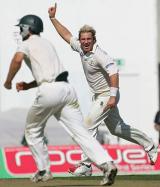
Shane Warne took five wickets at The Oval, included one handed to him by Michael Vaughan
© Getty Images
|
|
There was one escalator in operation at Oval tube station this morning, and
one of those barely moving queues trying to use it. Because of the risk of
bowlers of ten feet in height, the front window of the press box has been
fitted with screens on the opaque side of translucent: one must watch the
game as through a glass, darkly. This was bad enough, but English
workmanship on the cricket field wasn't much better.
Particularly at fault was the captain. There have been some bad shots
played this series; it has been such a pressure cooker that execution is
bound to falter as nerves fray. But Vaughan's ugly attempt, while
off-balance, to tug Warne through the on-side was a careless, inattentive
piece of cricket under no pressure at all. He has played the shot with
impunity this series, but Clarke here was placed with great deliberateness -
and obviousness. His dismissal brought the callow Bell to the crease with
twenty minutes to lunch, and resulted in the waste of another wicket.
England had some misfortune later - Strauss succumbed to a super catch, and
Collingwood to Koertzen's fickle finger - but the first rod for their back
was of their own making.
The result is "advantage Australia", and it could be significant. I have
been struck by how much has already been based on the idea of the Ashes
coming home: Andy Flintoff's column in the Sun this morning was all about
what he would do if England won. Some observers, too, seem to have already
reached next Tuesday, and it's still only Thursday. Someone's planned a
parade, for heaven's sake, which sent Mr Hopps' Fate-Tempting-O-Meter off
the scale. It could be another classic case of shoddy English workmanship:
putting the cart before the horse.
Wednesday September 7

|
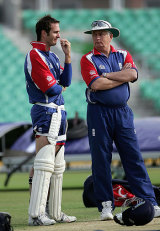
Michael Vaughan and Duncan Fletcher need to defy Australia one more time
© Getty Images
|
|
RC Robertson-Glasgow once invited a girl to the cricket. "No thank you,"
she said. "Cricket is all just waiting." In this case, though, the most
intense waiting is now all but done. There will be anxiety for players but
also relief that the finale of the summer has arrived. I spent the day not
at The Oval listening to players say that an important Ashes Test was about
to start, but wandering round Cambridge. Visited the Wren Library at
Trinity College which displays, among other priceless relics, the 1679
letter in which Isaac Newton first sketched what became the theory of
universal gravitation. It is this that always stuns me about England,
coming from a country where almost everything is mediated, replicated or substituted for a real thing somewhere else.
Is the theory of universal cricket gravitation about to catch up with
England? It is no surprise that Glenn McGrath will play tomorrow - I think
he would have bowled from an iron lung - and it would not be astonishing if
some tattered batting reputations stitched themselves back together over the
coming days. Read off the page, Australia's batting order still somehow seems likelier to make runs; England's bowling and fielding this season has
truly been beyond praise. It will be piquant, and another example of the
curious crossover of ideas and identities between the sides, if Australia
tomorrow chooses to take the extra bowler into the game and England the
extra batsman. The bookies will list Australia as favourites: again not
surprisingly, as they are the known quantity, while it is England that has
shown the capacity to produce the unpredictable. And that could all change
within a second or two of the coin falling, for the toss is crucial. The
team that takes first innings can drag the match away from its opponent in
the first two days; like the law of gravity, that applies equally to
everyone involved.
Tuesday September 6

|
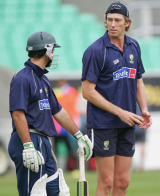
McGrath's injury is the one that matters: his selection is a risk worth running
© Getty Images
|
|
Watching Simon Jones limp barefoot around the outfield at Trent Bridge on August 28, while his team strolled their victory lap, it was hard to believe he would be fit to play eleven days hence, and so it has proved. English fans need not feel too let down. If anything, this belated injury highlights how successfully they have staved off sod's law all summer.
Who would have thought their top six would have justified retention for the duration of the series? Who could have imagined that Flintoff would bowl as he has, without bursting a gasket or blowing a fuse, while still making crucial runs into the bargain? Time was when every second seamer England selected would turn up with a note from matron excusing them from games. A critical area in which England has improved this series - and made up a huge difference on Australia - is in its management of its bowlers' aches and pains. Like wicketkeepers and umpires, physios and medicos are doing their best work when they go unnoticed. This season, England's have been outstanding.
Jones will be awkward to replace: James Anderson is not a like-for-like swap, and Paul Collingwood is a plausible defensive option who would not be intimidated by the occasion. Yet I still tend to believe that the injury that matters is Glenn McGrath's. The risk of taking him into the match is that, in the worst case, Australia would be burdened by a three-man attack, but in a match of this importance it smacks of a risk worth running.
My years of experience as chairman of selectors at South Yarra CC tempt me to present the following formation: Langer, Gilchrist, Ponting, Martyn, Clarke, Katich, Watson, Warne, Lee, McGrath, Tait. Gilchrist's only hundred of the tour was at The Oval, and I would back him to prosper here if spared the perplexities of reverse swing; Shane Watson would provide batting and bowling cover. I don't for a moment expect that Trevor Hohns and his colleagues share my thinking, but I do like the idea of picking a team whom I wouldn't have to ask to bring their match fees and afternoon tea.
Monday September 5

|

All quiet: there are just five Australian journalists covering the 2005 Ashes
© Getty Images
|
|
You would not have thought that England was short of Australians, but so it would seem. In the next week, my diary contains two appointments with Channel Four, and engagements on the World Service, Radio 4 and Radio 5.
Why? The answer is always the same: "Because we are talking about cricket and need an Australian." It seems like a bad sign if I am the best they can do, but it is also a reflection of the steady dwindling of the visiting press corps. When Ian Chappell's Aussies faced their day of destiny at the Oval in 1972, the travelling troupe of antipodean journos numbered about 30.
Thanks to the steady consolidation of media ownership and decades of incompetence in newspaper management in Australia, only seven of my countrymen are reporting home on Ricky Ponting's Aussies doing the same. The print, radio and television needs of home are covered by Jim Maxwell for the ABC, Chloe Saltau for Fairfax, Rob Craddock and Jon Pierik for News Ltd, John Townsend for the West Australian, Adam Cooper for Australian Associated Press, and freelancer Brenton Speed who provides the news footage used by all the television networks. All of them are very good, all of them are terribly overworked: Cooper seems to be umbilically attached to his laptop.
On Friday night, England's Cricket Writers' Club held their annual dinner at the Hotel Intercontinental. About 250 people attended, not all but the vast majority of them journalists: it was very convivial and very collegial. My Guardian colleague Alex Brown, here on a six-month secondment from the Sydney Morning Herald, commented that a similar dinner in Australia could be held around a table in a Chinese restaurant. Just remind me: which of our two countries is the sports mad one with the world champion cricket team?







